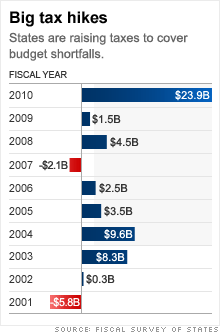Taxes, taxes everywhere
Strapped states hike taxes and fees by $24 billion for fiscal 2010. Residents pay more for speeding, entering horses in races and digital downloads.
NEW YORK (CNNMoney.com) -- Speeders doing more than 85 miles per hour in Georgia will soon pay an additional $200 in fines. Racehorse owners in New York now must fork over $10 to enter their steeds in events. And Massachusetts started charging a 5% tax on broadcast satellite service.
These measures are part of a record $23.9 billion in tax and fee hikes and $7.7 billion in other revenue increases enacted by states in fiscal 2010, according to a report released this week. This is a massive jump over the $8.1 billion in revenue hikes instituted the previous year.
"These are the highest tax increases ever," said Scott Pattison, executive director of the National Association of State Budget Officers, which co-produced the semi-annual report with the National Governors Association.
And more taxes increases are likely on the way, experts said.
States are wrestling with some of the worst budget deficits since the Great Depression. Rising unemployment has wreaked havoc on their vital revenue streams of personal income, corporate profits and sales taxes.
Though governors and lawmakers are reluctant to raise taxes, particularly in bad economic times, the current fiscal situation has left them little choice, Pattison said.
Some 29 states enacted revenue hikes for fiscal 2010, which began on July 1 in nearly all states. Personal income tax hikes accounted for the largest portion, some $10.7 billion. Corporate levies declined by $202.2 million.
An increasingly popular measure is the so-called "millionaire's tax" levied on wealthy residents.
Connecticut, for instance, raised its personal income tax rate to 6.5%, from 5%, for single filers with income greater than $500,000 and married couples earning more than $1 million. The increase in rates is expected to bring in $594 million.
Wisconsin hopes to collect an additional $278.5 million with a new tax bracket of 7.75% for its highest income earners - single filers making more than $225,000 and married couples earning more than $300,000. It also decreased the threshold of capital gains subject to tax to 30%, down from 60%. (The state maintained the 60% exclusion for gains on sales of farm assets.)
Another common revenue raiser is hiking cigarette taxes. Florida added a $1 per pack surcharge, while Delaware upped its levy by 45 cents. Kentucky increased its cigarette tax by 30 cents and doubled the tax on other tobacco products.
Many states added a slew of new taxes and fees to refill government coffers. New Hampshire now taxes gambling winnings, while Rhode Island instituted a $100 fee for the expunging of criminal records. Vermont extended its sales and use tax to digital downloads.
As part of a fee frenzy, New York established a $10 charge on horses entered in races, as well as a $50 bad check charge and a $100 fee on tax preparers who complete 10 or more returns. Those wanting to be certified as a security guard instructor now must pay a $500 initial fee and another $250 every five years.
"These were some of the difficult actions that were necessary to help address a record budget deficit," said Matt Anderson, spokesman for New York's Division of the Budget.
The Empire State was facing a shortfall of more than $20 billion. And despite these measures, another $3.2 billion mid-year gap has opened.
Georgia drivers had better not put the pedal to the metal or they will face a $200 fine and be labeled a "super speeder." The charge will be levied on those who drive more than 85 miles per hour, or 75 miles per hour on a two-lane road. The fee takes effect on Jan. 1 and is expected to bring in $23 million.
Seeking to eliminate a $2.5 billion budget gap going into fiscal 2010, Massachusetts officials searched for new ways to raise money. They found one in creating a tax on direct broadcast satellite services' revenues, which is expected to generate $25.9 million.
"The state was looking for some additional sources of revenue," said Bob Bliss, spokesman for the Massachusetts Department of Revenue.
The 5% tax will be levied on the satellite companies, but they are expected to pass it along to their subscribers.
These tax increases likely won't be the last. Only five months into their fiscal year, another $14.8 billion in shortfalls has opened. And lawmakers and governors must contend with an estimated $21.9 billion gap for fiscal 2011, according to the report.
"I wouldn't be surprised if we see more tax increases," Pattison said. "We haven't hit bottom." ![]()



